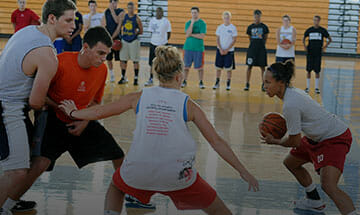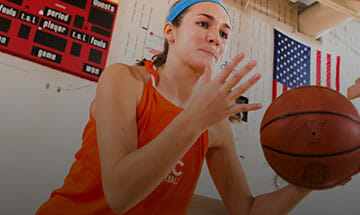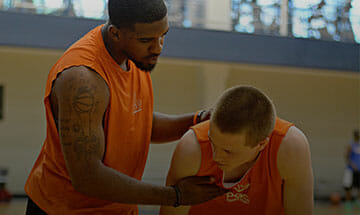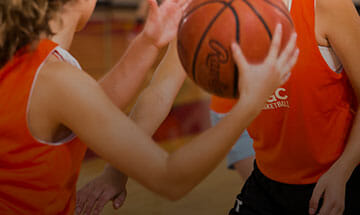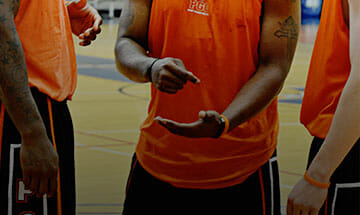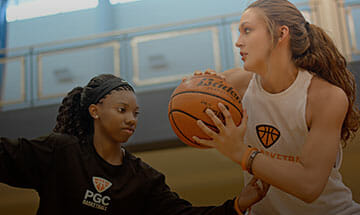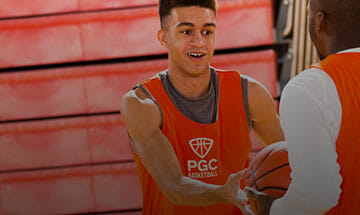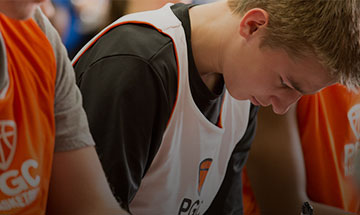The founder of PGC Basketball, Dick was a highly decorated high school and college player who was regarded as the prototypical “coach on the court.” He was named as the best high-school point guard in America by Parade Magazine and went on to earn Academic All-American and Atlantic Coast Conference (ACC) all-star honors at Duke. Later, he played and coached professionally in Europe and South America.
An English major and lover of literature, Dick authored five books during his lifetime—including STUFF! Good Players Should Know, praised as “the ultimate guide to playing the game the right way” by Larry Brown, the only coach ever to win both NCAA and NBA championships. Devenzio was considered by many to be a basketball genius, and Dick’s books continue to influence basketball lovers all over the world and have been translated into several foreign languages.
During college, Devenzio began running his own summer basketball camps, and he continued to offer sessions every summer until his sudden death in 2001 at just 52 years of age. The program he was most proud of, however, was the nationally acclaimed Point Guard Basketball College, the predecessor of PGC Basketball. Although Dick’s ingenuity, humor, and creativity are missed, his principles, ideas and teaching remain at the core of PGC's programs.
Defending a Stronger Player
When you are guarding a stronger player, especially when he has the ball, how do you combat his pivots and his movement to the basket? How do you stay close to him and apply pressure without getting an apparently accidental elbow in your eye? It can be very difficult to apply pressure and hold your ground unless you can protect yourself in the process. Protecting yourself is the key ingredient, because no player is permitted to make contact intentionally. Intentional contact will result in a foul and a turnover, so a strong player who uses his strength merely to run over you or push you is of no particular concern. He is a poor player and will soon be out of the game. The problem is with the good player with strength, more strength than you.
Hand Position on Defense
Coaches always urge, “Hands up!” so their players will distract the offense and deflect passes, and players prefer to play with their hands at their sides. Because it is easier to move with hands at your side. (Sprinters don’t raise their hands until they cross the finish line.) In guarding the ball, there are times to play with hands down and times to play with a hand up. If you are guarding a dribbler, your hands need not be up, they should be down faking at the ball or helping your body stay in good position, on balance.
Learning How to Lose
No one is quite sure about how a player is supposed to act after a loss. It doesn’t seem necessary to cry for a week, especially since you are likely to have another game within that time. Yet, it doesn’t seem quite right to walk off the court laughing either. Naturally, some losses will be more bothersome than others, and, just as naturally, every player will lose sometimes. Therefore, it seems intelligent to prepare a response in advance for those unhappy times when the inevitable happens, you lose.
Get to the Elbow for Offensive Boards
No one is quite sure about how a player is supposed to act after a loss. It doesn’t seem necessary to cry for a week, especially since you are likely to have another game within that time. Yet, it doesn’t seem quite right to walk off the court laughing either. Naturally, some losses will be more bothersome than others, and, just as naturally, every player will lose sometimes. Therefore, it seems intelligent to prepare a response in advance for those unhappy times when the inevitable happens, you lose.
Criticism: It’s Part of the Game
If you have a good coach and you are a good player, most likely you have already learned that the only intelligent response to criticism from your coach is to accept it, keep your mouth shut and try to learn from it. No one, especially tough competitors, can ever be expected to like criticism, but you certainly must be able to take it and learn from it.
Click, Click, Click: The Value of Click Passes in Basketball
A click is when the ball comes into your hands and goes out again in an eighth of a second. Not a second later, after you look around. Not a moment later, after you first check to see if you can get a shot. But immediately. You catch the ball, you throw the ball–like a second baseman on a double play. The only way you can make a click pass is to know before you get the ball what you are going to do with it. That takes good court awareness.
Excuses Don’t Belong on the Basketball Court
Excuses are for mediocre players. Forget them. There are thousands of excuses available to all losers. To have a good excuse is to have what every other loser in the history of the world has had. Don’t make the ridiculous mistake of thinking that your particular brand of excuse is somehow more valid than the last 20 million that have been uttered.
How to Remember What You Study
Before we get into how to remember what you study, let’s look at how not to do it. Cramming is what most students do. They put off studying till the last possible moment, then go crazy, drink coffee, drink Red Bull or take pills to stay awake, and try to force all sorts of facts and information into their brains on the night before the exam.

